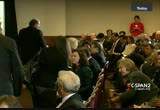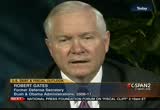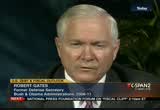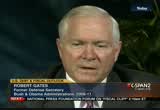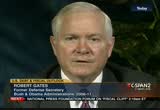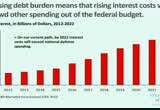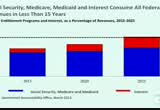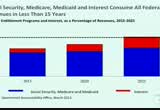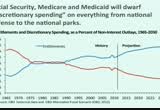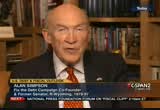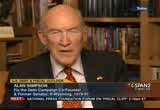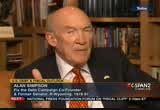tv Capital News Today CSPAN September 17, 2012 11:00pm-2:00am EDT
11:00 pm
thank you. please. thank you. [applause] hello everyone. it's great to be here in pennsylvania. it's a state where i grew up in and my husband grew up actually and thank you debbie for that inspiring introduction. i remember writing that no. i remember you going through it and you are one incredible woman. isn't she? [applause] and of course i want to thank all of few. i came here to thank you for all that you are doing for our campaign. i'm not just here to say as the wife of our vice president but as a mom and as a military mom, i love seeing veterans and military families for obama. [applause] i'm a full-time teacher and of course as a woman i want you to
11:01 pm
vote. [applause] and i have seen first-hand just how barack and joe stand up for the rights and freedoms of women every single day. barack is the son of a single mother who worked hard to him pay the bills and joe has been standing up for women since he was in the senate. piece says his proudest achievement was riding the violence against women act. [applause] so it is no surprise that the president signed his very first piece of legislation that he signed with four women to earn the same pay as men. [applause] our president has appointed more women to cabinet level positions
11:02 pm
and more women to the federal bench than anyone in history. [applause] that is worth clapping for. and that doesn't count our wonderful supreme court justices, it elena kagan and sonia sotomayor. [applause] and of course as debbie said, the president work so worked so hard for health care reform. now insurance companies will no longer be able to charge us more for coverage than they charge for men. [applause] and they have to cover basic reprentative care like mammograms in prenatal care with no co-pay. [applause] and for the young people in this audience you can now stay on your parents insurance until you
11:03 pm
are 26 years old. [applause] and if you have a preexisting condition like breast cancer or asthma or even pregnancy, your insurance company will no longer be able to discriminate against you. [applause] as a teacher i'm grateful for the actions that the president has taken to make it easier for our students to get a college degree. he has double funding for pell grants, five hard to keep the student loan interest rates low, cut taxes that could save families $10,000 over four years. president obama took these actions because he wanted to make sure that all of our kids and grandkids can afford the education they need to fulfill their dreams.
11:04 pm
[applause] as debbie said, there is so much at stake in this election and for women of my generation, one thing is for sure, we know we can't go back and re-fight the battles that we fought decades ago. [applause] we know, we know it's important for us to make their own decisions about our health care. we have got to realize how far we have come in now have got to do our part to keep moving forward. that means talking to all the women in your life. you have to educate them especially the young women. talk to them about issues that are at stake where young women will have the same opportunities as young men, whether our kids will be able to afford college without going broke and whether
11:05 pm
we will have an economy that works for everyone. we need to help them envision what what two or more super conservative nominees would mean on the ballot of the supreme court. we have got to educate them. and finally, ask them if they trust to stand up for women and keep expanding our rights and freedoms. [applause] i know my answer. i know who i trust and i think i know your answer too. today i want to ask you to do everything you can between now and november to make sure that barack and joe have four more years. [applause]
11:06 pm
[chanting] >> thank you. if we want four more years you have got to register to vote and make sure that everyone you know is registered to vote specially those kids in college who are voting for the first time. the voter registration deadline here in pennsylvania is october october 9, not that far away. so we are trying to get as many people as we can registered. so if you haven't already signed up, sign up to make phonecalls and go out and candace. we need you to get involved. just yesterday i was phone banking in michigan and everyone was so talkative and everyone i called said yes i want to help and i want to get involved. from now until election day, i want to ask you to give everything you have got to help get joe and barack elected.
11:07 pm
they know and i hope you know too that it's not just two of them that are going to move this country forward. it's people like you, women like you who are going to take us forward into the future. that is our campaign has been built and that is why we have made so much progress in these last four years. that is how we are going to win in november, so we can keep moving this country forward. so thank you for coming today. thank you for being here. thank you for voting. thank you. [cheers and applause] >> okay. give me another, give me another two minutes here. because i want to make sure that everyone understands what is at stake in what we need to get done here. we have 51 days. 51 days. now the other side, our friends on the other side of the aisle
11:08 pm
we like to see in our nation -- nation -- -- the most important resource that they think is important in presidential campaigns is money and that has been very evident when it comes to their corporate infused special interest funded super pac president to campaign. that is how they get it done. a handful of millionaires. we get it done how? the people. the most important resource and precious resource in our campaign is time. as a busy working mom i know every single day of balancing work and family, my time is much harder than writing that check. although we need you to do that too. don't let me minimize the importance of the resources too but this is a grassroots campaigns over the next 51 days we need you to take out your calendars and take a look at how
11:09 pm
much of those 51 days you can give us to help ensure that barack obama and joe biden have the white house for a second term. we need you to make sure that you help us finish what we started and you know so often as women we think differently than men, right? what women do most of the time, we are motivated by our commitment to helping others be successful so i know i'm involved in politics and public service because i want to make sure life is better for my children and the children of the families they represent and the kids all across america. so if you think you can't part with that time, i want you to think about your mom and your and your neighbor down the street who is battling breast cancer, your sister who may have just lost her job or struggling to find work, because we know the two visions that have been laid before american voters are very stark and the contrast is very clear.
11:10 pm
so when you think you are too tired to knock on one more door or you get home from work and you just can't bring yourself to get out of a kitchen chair and go down to the obama for america headquarters and spend one more minute, i want you to think about the people in your life that are important to you and how much progress we have made for them. remember 2008 was historic but for the women of this country and i told you my personal story, 2012 is personal. we are not going back. we are going to carry barack obama and joe biden back to the white house for his second term on the shoulders of pennsylvania's women. thank you so much. [applause]
11:11 pm
11:12 pm
and its impact on national security. the center for strategic and international studies and other debt policy ergen stations are hosting the discussion. later we will also hear from president obama's debt reduction commission co-chairs erskine bowles and alan simpson and former white house budget director alice rivlin. this is about three hours. >> this is the start of congressional hearing that unlike the past when i waited for them i get to start. thank you all very much for coming. my name is john hamre and i'm the president of a -- and very honored we are given a chance to partner with these other very important institutions to bring to the public debate, the debate we should be having. i hate to say it but congress is heading out of town and i don't know if you saw the poll ratings but they have 12% popularity. that is because the for it
11:13 pm
combination of reasons. they are not doing their job and we need, we need politicians to help us find solutions for america, more now than ever and that is the reason we are offering this to our colleagues, to try to provide a debate we should be having in america. i have said on other occasions, we are facing the most perilous times from a national security standpoint in my memory but the threat is thread is not outside the united states at this time. at their inability to get their act together and in my view the greatest risk we face from national security standpoint. we want to drill in on this today and i want to say a special thank you to these remarkable leaders who have decided, as talking with chairman gray and he said he has been spending too much time on the outside avoiding trouble and now he realizes the country needs to get in the middle of it to make trouble and i'm thankful he is willing to do something like that.
11:14 pm
let me turn it to sam subeight. one thing i will say when you work for a senator you work your whole life for them and the advantage of coming to csis as i get paid, so he is the chairman of the board. i turn it over to you. >> thank you john, thank you very much. at least i never did to you what my former senate colleague did to george tenet when he was head of the cia. he used them call them up and make his hotel reservations around the world. [laughter] so i'm not that bad, john. thanks john for your outstanding leadership and for hosting these forums. i also want to thank again my cochair and evan evan bayh who is a full partner here and helps plan these forms and of course pete domenici who will be both a cochair and a presenter today with alice rivlin, alan simpson,
11:15 pm
erskine bowles during our second panel. it's going to be a great pleasure to have you as a witness. i have served with you and we have done a lot of things together. i know i will ask you hard questions. >> my questions are going to be deferred and answered by -- [inaudible] >> in our first forum last week jim baker and bob rubin made it very clear that america's present fiscal trajectory and debts are very dangerous to our nation and at a u.s. debt crisis with little or no warning is a real possibility. in a few minutes we will hear from former secretary of defense bob gates and former chairman of the joint chiefs admiral mike mullen on their views of the security and foreign-policy vocations of our current fiscal outlook so we look forward to that testimony in just a few minutes. our second panel today we'll hear from former u.s. senator alan simpson former white house chief of staff erskine bowles and budget committee chairman
11:16 pm
and our forum co-chairman pete domenici and former office of management and budget direct or alice rivlin. these four individuals will present their findings and recommendations of their bipartisan panels which were separate undertakings but which came to broadly similar conclusions as to the steps that must be taken in response to our fiscal challenges. i am confident both of our panels will address the subject of sequestration or going over the cliff or whatever the title is these days, which by law will occur in the beginning of next year. i'm hopeful that our discussion will not just include the sequester matters and concerns which are very legitimate but will also go into long-term but essential structural problems and challenges that must be addressed and solved. most analysts believe that our lawmakers at the white house will find a way before january 12 leg the worst effects
11:17 pm
of sequestration particularly in the defense arena. even if this is a -- the threat alone is creating a climate of uncertainty that is harmful to the defense industry and defense employees and harmful to defense planning and harmful to the confidence in america's leadership abroad delete avoid an acute crisis in the short-term interest on escalating debt will increasingly dominate the budget and interest rates will inevitably increase putting more and more pressure on all other parts of the budget and certainly on national security and the defense budget. trade-offs will become necessary between the size of the active military force in the health of of the defense industrial base. this problem is exacerbated by the dynamics within the defense budget itself. the same broad trends affecting the u.s. economy are affecting the pentagon's budget, the rising cost of health care and retirement costs. other countries including our
11:18 pm
allies and adversaries pay close attention to america's fiscal problems. the debt problems makes diplomacy, development and prevent a defense less feasible so shaping the environment as our military leaders like to say to prevent war becomes much more difficult. according to the congressional budget office's latest projection defense spending this year will be just under 20% of the entire federal budget totaling $670 billion. this accounts for roughly 1/2 of what is called discretionary spending. the portion of the budget not on auto met a pilot that is determined to the annual appropriation process. the united states spent more on defense and 2011 then the 13 countries with the next highest defense budgets combined but of course we do fight a war including trying to complete two wars while fighting another war on terrorism every day and maintaining a global presence to protect trade routes and
11:19 pm
economic white lines around the globe. given the size of the defense budget it is clear that any credible approach to deficit reduction must include defense as well as other parts of the federal budget. we must not however bang away with the mindless sledgehammer. we must manage effectively and wisely over time, over time with the security of our nation is the top priority. federal revenues and expenditures are shaped by our national economy and in a democracy they are shaped by a public -- we cannot divorce the debate over national security from the fact that since 1960 our national spending both public and private on medical care has gone from 5.7% of our gross domestic product to over 17% and has rapidly headed toward 20%. neither can we ignore the reality that our population is
11:20 pm
steadily aging. we live far beyond the age of 65 and life expectancy when social security was created, and not sure of the last numbers on life expectancy but it's in the mid-80s. that makes a huge difference. social programs created with the expectation people would live to the age of 65 and we are now thank god, thanks to better development technology we are living much beyond that with the social programs in and the funding of those programs have not been fundamentally redressed to reflect that reality. these trends will affect our economy and well-being and certainly affect our nation's security in the broader context. finally, since we here at csis, we are holding three of our four forums here. since csis is one of the world's premier defense policy institutes and since one of the founders of csis was admiral --
11:21 pm
let me quote from tony's recent report on the defense budget and our fiscal crisis. he quotes from tony and they're not necessarily in the order he made them so i will summarize them. number one, the united states still dominates world military spending but we must recognize that maintaining the u.s. economy is a vital national security interest. number two, the u.s. military and national security spending already places a burden on the u.s. economy than during the peaceful periods of the cold war and existing spending plans will lower that erred in further in the future. number three, the department of defense needs to make a major new effort to deal with its own self conflicted threats, lack of cost control and realistic landing of future budgets plus the massive rises in the cost on active duty. continuing quote from tony.
11:22 pm
number four, the real pressures on federal spending are driven by entitlements which are driven by the fact that most americans do not save adequately for retirement and massive rises in the burden of all medical care costs. the government and private and the pressures they put on the economy and quote. so i commend tony and the csis national security teams report for all of those who are in just his national security as well as economic security and who would like some relief from the current campaigns flawed addition and subtraction. at least that is my view. again i think or steering committees who are with us here today. bill gray and jane harman have joined us and they were members of the steering committee and they have joined us today and we are delighted to have them and jim roemer former united states congressman who was with us in
11:23 pm
our first form. i would also like to again thank the organizations who have made these forms possible. csis the bipartisan policy center as well as the american business conference and the james a. baker of the third institute of public policy at rice university, the belfer center at harvard university. p. let me turn to you and then we will hear from other committee members and we will get to our witnesses. >> thank you very much sam and mr. chairman. let me say what a pleasure just it is to serve with you and by -- if we have a shortage of time i need not make these opening remarks. i will try to be very brief. first of all, it's an honor to have these two participants, patriots, with us today. the nation owes them both a very very large debt of gratitude.
11:24 pm
admiral mullen, though you are far away fiscally from us we have use some of your quotes extensively in the past several days so that your words are right here with us today. secretary gates, you will come to us from where you are in texas. many of the reforms that he was dedicated in defense spending have guided the work of the bipartisan policy center debt reduction task force which i cochaired with dr. alice rivlin and your reform permitted and justified us makings of substantial reductions in defense but nothing like the bludgeon that will occur under the sequester order that is r.d. law. you have also guided us in the work of our analysts on the impact of the defense sequester on a national security and the nation's economy. we face these mindless across-the-board cuts called the fiscal cliff by some, because
11:25 pm
policymakers have failed in their fundamental responsibilities developing fiscal paths that give the nation both long-term debt reduction and short-term boost to economic growth. failures of the past several years and especially the past 18 months have led the nation to the edge of this cliff. i cannot imagine a worse way to reform defense spending and procurement of defense needs then using the instrument we call sequester. are chairman nunn has said this is almost a suicide pact. that is true. if we don't do fiscal change -- then we are going to shoot ourselves by using the sequester. i don't know where we will shoot ourselves but it will be lethal for sure. they will hear from both of you today, your recommendations and thoughts and there are no more
11:26 pm
qualified individuals to let us know the relationship between fiscal policy and american security and it's my pleasure to be able to participate. today i get to share with the committee a proposal that we put together as an alternative to the one that was put together by the administration we will look at the overall picture including defense and all the other things to see how we can get out of the mess we are an. one last remark, was thinking to myself how many meetings have i attended where we have addressed this issue? how long has it been front and center in the minds and hearts of those that know and love america, those in positions who know and do something about? manning any months if not years, we know we must fix this but somehow it doesn't get across. those who say it to the people of our country, some way or another don't quite believe it. we don't want to wait until it
11:27 pm
happens and then say, you see, we said it would happen. america has gone over the cliff. our u.s. dollar is no longer the value of the world and we are in one mass as a nation. we don't want that to happen. we want to fix it first and that is what this is all about. thank you. >> thank you very much pete and john tanner was at our first forum and we are glad to have you again john, former congressman from tennessee and jane harman we are delighted to have your today and since you didn't make the first forum we will give you a few minutes for whatever comments you would like to make. bill gray we are delighted to have you join us today. bill is a former congressman from pennsylvania and former chairman of the house budget committee. jane. >> thank you, sam. sitting here with former colleagues and dear friends i can't help but is served that security is also a woman's issue. i served in congress for nine
11:28 pm
terms from the california aerospace industry and was on all the major security committees, armed services, intelligence where tim and i served together in home and insecurity. i left last year to defeat lee hamilton at the wilson center. today is the jewish new year, and at temple this morning i prayed for peace and prosperity both at home and abroad. my sunday schoolteacher taught me that he prayed not to be given something but for the will to do something. so i've decided to come here this afternoon to do something about our budget and national security. last friday the white house released a report detailing the chilling potential effects of sequestration on every aspect of military procurement and operations. particularly alarming in last week attacks on u.s. and other embassies and consulates abroad is the diplomatic or grandson embassy security would lose
11:29 pm
$1.2 billion. i know and many of us up here know that with political will we can avoid this. because we have done it before. i was in congress, most of us were in the '90s when we were together to balance the budget and did this in 1997, five years of prosperity follow. then came 9/11. the world changed and i-budget discipline collapsed. and now that vote in 1997, 15 years ago seems far far away. on wednesday the wilson center will rollout the election it vision of a serious gain that enables people to see the hard choices to read and fiscal sanity. this audience should check it out on our web site. i have devoted decades to protecting our national security and still serve with some others
11:31 pm
11:32 pm
[applause] we're honored to have admiral mike mullen with us hear today spending 43 years in the u.s. military after graduating previous military academy. many aviano since 2010 he believes national debt as the biggest threat to to national security. he doesn't try to shape in political debate, but giving best advice and counsel to a country he has served over four decades. military and retired needs to stay above the fray in this environment and will do
11:33 pm
that today but continued -- agreed to join us with his continued love for the nation. the admirable lows they need to address the debt but will undermine everything we need for every the mayor willing to fight and die for. i cannot think of two people who are more qualified secretary gates will be coming in by satellite is that the preference that you go first? we'll introduce bob gates. is he on? >> distinguished panel i
11:34 pm
greatly appreciate you putting this group together and your leadership on the critical issue. when serving in uniform you always look forward to the last one. this proves there may never be a last one. i appreciate the opportunity to be here today especially with bob gates. to talk about our national security and economic health. two years ago while chairman to the joint chiefs, i was faster routine question, what is the most significant threat to to national security? my response was straightforward and simple.
11:35 pm
our dapper ipad ast again and again and answer the same way. our current rumbles of unsustainable debt this far out of balance cannot maintain insecurity in the influence of world affairs. it has no partisan meaning now. i was using our unsustainable that for the abundant disorder of the fiscal house brought upon us by ourselves and our own doing. little has changed. i would argue the passage of time combined as a lack of solutions, has compounded the problem exponentially. and solutions that require
11:36 pm
compromise seem a figment of the imagination. from the national security view it is no end in sight that intensified is the crisis if representative. the president has already reduced the defense budget by half a trillion dollars. i supportive and i was chairman and still do. deity will sustain another half a trillion dollars in cuts not for many national security strategy. civilian aid will not be able to tailor spending reductions and a way to strengthen, not weaken the country in the future. this will take place in a world of fun and growing -- growing
11:37 pm
uncertainty just looking over the last week. as world's become dangerous and hostile to the 90 states. the fiscal crisis peak said a time when families are stretched and stressed as we begin our 12th consecutive year of war. moscow while we are in the fiscal morass and they're still troops at war in afghanistan and a couple hundred thousand more deployed from the world doing the nation's bidding as they have done for decades. our military missions must continue viability to resolve our own differences remain paralyzed. it is a 225th day of the
11:38 pm
signing of the constitution. whose very framing signals a compromise necessary to found the country. after war a tendency is to come home and isolate. this could the happening with reducing budgets other than to have the number. it would make a dangerous world more so. this is different from the forties, seventies, nineties. poorly targeted national security budget reductions will undermine the security interests. i recognize we face historic challenges at this time everything must be on the table. including defense spending. dot must pay its fair share
11:39 pm
but if we owe big-budget we would hardly make a dent. our continued irresponsibility could cause for budget reductions unless we turn around the decline. this guarantees we end up with the 47 able to conduct its training and maintain its equipment and un able to fight. and unable to recover the ravages of a decade of war. i don't have enough fingers to point* or a fix blame. my urgent appeal is to get to the higher ground to do so sooner rather than later. there will come time when we
11:40 pm
try to kick the can and it will not budge. it will be a process that needs to start now. doing nothing but compromise. since i retired almost one year ago i have not met one american citizen who was not extremely worried and is not what the problem solved in a mature way. i am worried the time shorter than me realize. we're steadily drained of economic strength it is being sapped as well. also my generation for the first time in american history we'll leave our precious country and where
11:41 pm
shape than when we received it. we're bigger and better than this. we are americans. nothing is impossible. also to pick up on one more point* on the quotations, those that have doubled or tripled depending on which statistic you believe. that we all participate in then and endorsed since the mid nineties. it is less than 1%. less than 1% who has borne the burden of the last two
11:42 pm
wars who have paid the ultimate price by 7,000 tens of sows then the wounded physically and hundreds of thousands who bear the wound of the war those serving in iraq afghanistan and those who make us proud. as a take up the debate with respect -- respected defense and military is in good shape to make sure we get right for people and their families. it is the strength of who we are as a military.
11:43 pm
fighting wars we have a pretty healthy discussion what that means even with 70,000 still exposed. what that means as a country and as a military for the security requirements to challenge us at home and globally around the role. thank you for speaking to these issues as a nation of greatness it can and must be sustained. also begrudgingly look forward to your questions. [laughter] i am kidding. [applause] thank you admiral mullen for
11:44 pm
your powerful testimony i am not informed whether secretary gates is available on satellite yet? we can start asking you questions of love. [laughter] what makes this unique? you have been through wars wars, then defense budget going up and down. is raising unique compared to previous years of history? >> before was chairman i spent a lot of time in the navy. i grew up in that world just
11:45 pm
part of 9/11 return to be the program officer. part of vernon clark was counseling us the historic ups and downs of the defense budget if you go back and what as early as 1935 it goes up and down of a steady pace over 18 or 19 years. saute expected the budget would tip over. i did not anticipate it was at a time when the country was that of fiscal crisis.
11:46 pm
makes it more difficult to plan for the future. we do this five years out and historical a it is a good plan but looking at capabilities that we need. that just speaks to good i agree of difficulty with the budget reduction habits -- happens with it appears to be slated it is the intensity and the ability to plan. i know budget people love to go to numbers so we are focused on doing that
11:47 pm
without any strategy. i'm not as hopeful as others we will not drive off the cliff. i am worried sick quite frankly. going to another quote from andrew, already the comptroller's are pulling back. wherever the act's may fall to not spend money this year as we get to the end of this gold 12. maybe the intensity and added time we have fought and come home and still fight in afghanistan. it is still unique. >> the secretary of defense
11:48 pm
is no longer a wall coming in on satellite. we will come back to questions. lemme give the abbreviated introduction in. june 30 as a secretary gates retired after serving four years of secretary of defense under george of the bush as well as barack obama. he has served in leadership roles of central intelligence agency and national security advisor. it was sworn in as the 22nd secretary of defense. before that dr. gates was the president of texas a&m university. prior to assuming that to
11:49 pm
serving towards 992001 and has been awarded the national security medal and twice received a national service medal and the cia highest award on his last day he was awarded the highest civilian honor suffice it to say he is one of the most honorable public servants i have known. you are about to appear on our screen. admirable -- admiral mullen has already made his statement.
11:50 pm
11:51 pm
11:52 pm
>> thank you for this opportunity to address the topic to the future of this country and to be back with my good friend and colleague mike mullen. i'd like to share crystle perspective and how the political system reached the impasse and also the defense spending in the context of a wider fiscal troubles. no doubt this could be a crisis of credit, confidence, our position in the world progress some point* financial insolvency we'll turn into strategic insolvency abroad. not yet but the longer the
11:53 pm
united states delays dealing with the problems know only make it to more risky with national security. we will get a preview how damaging this could be when hundreds of billions of dollars of spending cuts take effect 2013. more than 1.2 trillion dollars half of that comes from defense. it would be grave damage to a homeland security, and virtually all other operations. according to most experts without any strategy or prior to -- priority would send in a fiscal situation.
11:54 pm
to maintain national defense united states must get government finances in order. it requires the political class to make decisions that would be unpopular in the short run but so far there appears to be little evidence this takes place. all but a shrilled and ugly business as well as polarizing trends cannot execute the basic function of government much less those problems facing the country. some structural a highly
11:55 pm
gerrymandered system with both incumbents those beholden to the hard core ideological base. second wave election sweeping one-party with the agenda never making making -- making a difficult to sustain programs over time. a decline of power brokers may have been tough partisans but could make deals and enforce those agreements. and the digital media environment for the most vitriolic opinion leading to a dumbing down of the
11:56 pm
national political dialogue. is not a holding. it is equated with principles, compromise is means selling out to those that can and must be sustained most of the trends point* in the opposite direction. critical ideas come from thinkers from those on the left and the right to. those laws and policies come from the vital political center as compromise. added time with obstacles
11:57 pm
that home the inability of some in the political leaders today to step of the ideological cocoon is a threat to the future. but to score the ideological points following the presidential election we'll make the compromises necessary to put the country back in order. with america and power and credibility overseas. now i well address the role of our fiscal judges.
11:58 pm
with the lower share of gdp last anyone forget there is a war going on in afghanistan. ended 1961 defense consumed more than half of the federal budget. devoted to the military was 9%. by comparison and i love $530 million. and it represented less than 15% a number that climbs to more than 4% when the war cost from afghanistan are included.
11:59 pm
i sought to prepare the pentagon for the flat inane and decline of the defense budget. the first-aid still with procurement to when they were canceled or capped that could cost the taxpayers $330 billion. the last budget included $80 billion of additional reductions. then the budget control act $490 billion in defense cuts over decade. by the time i retired 2011 defense spending with
12:00 am
already cut by $900 billion. said this before we had to deal with defense spending authority it sequestration end to a place. the defense budget has already been cut. what remains are the much needed capability halt -- of maritime access, cyber warfare, ground forces forces, intelligence and reconnaissance. g4. . . . .
12:01 am
we should not fool ourselves in significant defense budget savings are possible, the kind that might put a dent in annual federal deficit without making substantial and in the case of sequestration, very destructive cuts in the ability of our military to defend the united states and in our vital interest around the world. consider also the wider fiscal picture. the defense budget may have to be on the table as a matter of
12:02 am
political reality, but as a matter of simple math, it is not fundamentally a cause cost of the long-term debt trouble in. roughly two-thirds of all federal spending goes to entitlements. the share of the budget is escalating rapidly given the changing demographics of the u.s. population. reducing defense spending by saeb in 15 to 20% in the near term would reduce the current annual budget deficit by just one tenth. 10%. the cuts on that scale would require dramatic reductions in size, reduction of the overall size readiness and overall capabilities of the u.s. military. and we need to be honest with the president, with the congress and the american people and with ourselves about what those consequences are. they are smaller less ready in less modernized military will be able to go fewer places and be able to do fewer things and the
12:03 am
risks to our men and women in uniform will only increase. if our elected officials and body politic truly wanted diminished role for the united states and the role then we can start paring back missions and ratcheting back with the corresponding military investments for structure. if future defense reductions cannot be avoided they should be phased in slowly, methodically and strategically in a way that protects our core security interest and does right by those in uniform. the history of past defense drawdowns is not encouraging in this regard. we almost never get it right. because no matter how many times we say never again to particular kinds of military operations, america's adversaries will always have a vote, as will our future presidents and if the history in the past century teaches us anything, it is that
12:04 am
cutting defense too deeply, too quickly, will lead ultimately to higher costs in blood and treasure later. since i entered government 45 years ago, i have shifted my views and change my mind on a good many things and circumstances, new information or logic dictated that i have yet to see evidence that would dissuade me from this fundamental belief, that america does have a special position and set of responsibilities on this planet. status provides enormous benefits for allies, partners and others abroad to be sure. but in the final analysis, the greatest beneficiary of american leadership in the world are the american people in terms of our security, our prosperity and our freedom. in closing while my presentation today is no doubt sobering and at some point stier, i still remain fundamentally optimistic about the future of this
12:05 am
country. even though the united states faces enormous obstacles, most of it self-inflicted, we also have the power and the means to overcome them just as america has done in the past. think about the early years of the cold war in the late 1940s, an era in which politics was every bit as ugly and confrontational as this country had seen before or since. president harry truman was a loyal democrat and a tough partisan. in his 1948 acceptance speech at the democratic convention truman referred to republicans as the quote common enemy who wants to stick a knife in the backs of the poor. republicans called truman's impeachment or worse on a regular basis. senator robert taft was a republican leader in the senate who famously said the purpose is to oppose any minute yet in the end it was in that earlier
12:06 am
hyperpartisan environment, members of that opposition, republicans like senator arthur vandenberg and representative richard richard nixon who in the face of a war weary and skeptical american public health truman passed the marshall plan that saved western europe from soviet domination. republican support was also critical in the passage of aid to greece and turkey which first but the strategy of containment in action. the creation of nato and the virtually all the farsighted policies and institutions that have sustained american security for the past seven decades. looking ahead it is unrealistic to expect partisanship to disappear or even dissipate. but when push comes to shove, when the future of our country is at stake, ideological and short-term political calculation on the part of both democrats and republicans must yield to part patriotism and the
12:07 am
long-term national interest. all told whether you'd the united states sustains our global economic, political and military preeminence will depend not on the actions of other countries but on what we choose to do. the compromise as we forage, the sacrifices we accept and the courage and unity we demonstrate. thank you. [applause] >> thank you very much secretary gates and i hope you can hear us. we heard all of your statement. it was loud and clear. u.n. admiral mullen had made to powerful statements that i hope will be heard throughout our country and protect elite by policymakers and elected officials. i'm going to turn to my colleague, pete domenici for the first question here and then we will rotate to the panel.
12:08 am
>> first of all, let me thank you senator nunn for asking me to be the cochair of this with you. i never thought that we would be this far at this quick in getting the issues formulated and out of the public and i believe today is getting the true facts as to how bad off the united states is because of the lack of leadership, the lack of comity and the lack of getting together and creating a lack of in some ways leaders of our bodies, our legislative bodies and others in leadership positions who don't quite get it. secretary gates said that if we wait for the adults to come back from campaigning, let us hope that those adults are from both parties.
12:09 am
let's hope lets hope they are willing to give and to compromise in the best interests of interest of this great country. i had a chance to talk with you admiral mullen and to seek as strongly as i could your -- coming here today and i can't say it any other way but that it was absolutely imperative that your answer was yes and that you came here today. between you and the secretary, we have heard the best evidence in my opinion on the need for adequately providing -- on the one hand on the other hand for not divorcing this sequester which is upon defense and all of the other domestic programs for our country. select me ask both of you a question. i would assume that both of you have had an opportunity to review the sequester and what its effects on the defense department and our people and
12:10 am
personnel is. is that a fair assessment that you're aware of? both of you are nodding yes so let me say to backup back up your testimony, the sequester is an across-the-board cut of defense and of domestic programs from a given point? it is already a law and i think people should know that, it became a law by default if i'm correct admiral mullen, when the supercommittee did not get its work done, the backup position was therefore we will get savings by sequester and this document was written and this document called sequester was passed by the senate, but the president as part of that package that encompassed the supercommittee. now i would like you to answer it with as much, adding to it as you can and want. do you think we should render
12:11 am
the sequester valueless? do you think it should be pulled? do you think the legislators in this country should take it out now so it will not become effective? i guess i am saying what will the effect be if the sequester is permitted to be carried out? would you answer that question please? we will start with the admiral. [inaudible] >> with respect to the damage of the sequester specifically, and i don't know if it's widely known, certainly it's widely reported that the president has the authority and would intend
12:12 am
to exempt military personnel from the sequestration. obviously what that then does is put the full burden of the amount on the remainder of the defense budget and going back to my time when i was ahead of the navy, roughly 50 to 60 to 65% of my budget went to people, active, retired benefits etc. so in fact, the full burden of sequestration would be put on roughly 50% of the entire defense budget, which makes its implementation that much more extreme. secondly, from my perspective it's really why i talked about the force because an execution which is what we would be an, it's very difficult to find
12:13 am
monies, significant amount of monies which would be under contract already so you can't undo that, so you get through the operations and maintenance funds if you will, which are significant and you start pulling the training money, the logistics money in the maintenance money because it's money you can get your hands on, the very near-term. so the intensity of moving to what i would call, despite the pentagon's strong desire to not go there, to move to a hollow force, is that much more significant. and then thirdly, i would speak to just the sequestration part of the act itself, and i think many people know this, it was described by robert gates successor to me as if secretary panetta as a neutron bomb and the idea being that it would be something that would be
12:14 am
unthinkable in any way, shape or form so that the a solution or a compromise would get generated. with respect to answering your question about whether it should be pulled or not, i guess i think about that in terms of motivation. i think we need to really take steps to solve this problem now. i think sequestration and execution would be incredibly damaging to defense and our national security interest. that said, if there is and that hanging over their heads, you would be much wiser in terms of reading this than i, what hangs over their heads to get them to a point where they would make the decision? i just don't know the answer to that. >> secretary gates, i hope you are following this from your locale and pete's question is also to you if you want to take a crack at it.
12:15 am
>> sequestration reminds me of the scene in "blazing saddles" where the sheriff holds a gun to his own head and warns the crowd not to make him shoot. this is no way to run government. across-the-board cuts are the worst possible way to exercise discipline. even before sequestration, when mike and i were working together, my guys was if we had to deal with budget cuts are we needed to find more resources, we would never resort to across-the-board cuts. are referred i referred to it as managerial cowardice, a refusal to make choices and establish priorities. sequestration does all of that on steroids, and i think mike has spoken to the problems that
12:16 am
we would face, but the realities are you are talking about fighter pilots who will have less time and the cost bit, less time flying, soldiers who have less time to train and fewer bullets to train with. these are the realities, the shifts that happen because we can't afford to rent them and that is what i was referring to in my remarks when i said sequestration will increase the risk to the lives of our men and women in uniform because the things they do to be prepared they will have to stop doing. and so again, as mike has suggested, i don't know the right solution for getting out of the sequestration mess, whether it's pulling or trying to buy some time or whatever, but what we do know is that the consequences for our military
12:17 am
will be dire. i think the illustration during this past week has outlined with the other costs will be outside of the defense department in terms of their traffic control, in terms of the national parks, in terms of virtually everything the national government does. and so, and they will be hit with the same kind of mindless lack of prioritization that everything takes a hit, the important than the unimportant. so it is a catastrophic way to deal with the deficit issue, and in some way needs to be found to do what mike has suggested, and that is how do you sustain the leverage on the members of congress and the president to come to the kind of agreements that are necessary to get our fiscal house in order without threatening to shoot ourselves in the head. >> thank you, bob.
12:18 am
built greg, let me call on you first and then we will rotate. >> first of all let me just say i am glad to hear both admiral mullen's testimony as well as secretary gates. i have one question which you might be a will to answer and that is of approximately the 670 billion-dollar defense budget what is the size of the first year cut in defense that each of you think is appropriate and what is the implication i'm a five-year basis of savings? >> acting secretary gates has pointed out very clearly that there had been significant reductions thus far but obviously the $490 billion or so that are resident in the 13th budget that the president sent to congress and other reductions he took under his stewardship while he was secretary.
12:19 am
i think of it executes as i recall, it will be upwards of $50 billion a year in sequestration if you will and so that is notionally and if you pull the cost of afghanistan of the award overseas out, which i think people do and don't at their convenience depending on if they want to talk about this problem but that is operations costs which i think obviously we have to fund, then particularly in the year of execution if you well, it just devastates the kind of accounts that both secretary gates and i were talking about in terms of training and maintenance and i think we far underestimates how quickly we could get there despite not wanting to get to a hollow force. there are instinct of things inside the force that would put us there as well, just how we do things inside and how we execute
12:20 am
because everybody fights for the money if you well. but, it it would principally be executed there. i think clearly is quick diaz the department could get to not issuing contracts, so we talked earlier about any programs which are over cost and i understand that and that is something that needs to be contained although an awful lot of smart people have tried to figure this out in the last 10 to 20 years and we haven't quite gotten there yet. what you would see at safer programs that then agreed or desire to keep those costs would automatically go up because those contracts would get spread out over future years, so in fact when you're trying to save money, in fact the programs you want you would have a serious impact very quickly on those kinds of things as well. and then lastly, we talked earlier about the cost of people. i think clearly with these kinds
12:21 am
of cuts you would have to go or the money is and certainly have the money is with their people and i would just want to be careful. doesn't mean you shouldn't take reductions because i think there is certainly an opportunity to do that but i think we need to be careful about our people and their families in which we have invested so much over the course of these two wars so on the right-hand side of all of this, the force is very much intact and can still represent us globally as we have been asked to both in peace anymore and also to be preventative in that regard and certainly prepared to go and when should the circumstances warrant as well. >> what do you think mr. secretary is an appropriate reduction given all the things that you as well as admiral mullen have talked about, avoiding sequestration between what would be appropriate?
12:22 am
do you have an idea of what amount that would be in the first year and out in five years because i agree with you. i think it would be a disaster to have the sequestration occur in the department and i think overall it really boils down to a lack of management to make decisions if we have sequestration across-the-board. do you have any idea in your mind as to what be the maximum amount that you would reduce the first year and then a five-year approximation? >> one of my concerns in terms of talking to the congress and to the president before he left office was the reality that we were already look at a 900 billion-dollar cut in defense over a ten-year period
12:23 am
map. that is already programmed in. $900 billion. i've been heard anything like that on the domestic side in terms of specific programs, specific plans but to pluck a number out of the air, i told the president of the congress was math, not strategy and i instituted before i left an approach that basically said before you make any specific decisions on that next size cut, that $490 billion of the president asked for, let's look at the strategy so that the president and the congress can make choices about what they don't want to do in the future. where do you want to cut the budget? that strategy was completed under mike and secretary panetta in the fall so i think that $490 billion is based on a look at strategic things rather than just doing it as a math problem so when you ask me how much i think the defense budget should
12:24 am
be cut, for the next fiscal year, my argument first would be its already been cut substantially and the question is then to the president and the congress, what do you want to stop doing? it's not just a math problem. >> thank you secretary gates. built braun, let me turn to you. we have got about 10 or 12 more minutes so i think we have time for everybody to ask a question. bill. >> at think i would like to get back to the question of the congress itself. you both have mentioned these issues. everyone of us who have served in the congress, everyone of us can tell you countless numbers of members that we respect, their honor and integrity and their patriotism. their willingness to work across party lines and they think they are trying to do that today. i just want to ask, this is such
12:25 am
an obvious issue. what does a member say to you when you have this conversation with them about these choices? how could they possibly give you a rational excuse for what they have done? [laughter] >> most of the time what i get and what i got when i was still in office and happily i have not testified since then, so my information is a little over a year old but what they would say to me for example when i was trying to the several dozen programs in 2009, everybody agrees on the importance of acquisition and procurement reform. everybody agrees that we need to do these cuts in a rational way. everybody agrees on the need for prioritization, but when it comes to specific votes on specific issues they vote
12:26 am
parochial interests. the f-22 has suppliers in 44 states and 88 senators. now in that instance under a veto threat from the president, we were able to prevail in terms of capping that program which every secretary of defense since dick cheney had cuts. so, the question is, how do you get the members of congress to forgo parochial interests in terms of what is in the best interests of the country as a whole? and i ran into this. mike and i ran into this on every single specific programs that we wanted to do. everybody at raise, the department of defense help your costs are completely out of control. we will spend probably $60 billion on defense department health care. nobody wants to touch the health
12:27 am
care that goes to our active force, but what mike and i proposed, with the president proposed, was with a very small increase in the health care premium and sees for military health care insurance for people between the ages of 45 and 60. working age people and yet the congress will not along with that. it's absolutely necessary. there has not been an increase in those premiums and 15 years. people say well, we had a deal. the government was always going to provide free medical care. that deal was off the table when the congress voted to impose a fee in the mid-1990s in the first place and nobody ever promised it that time that insurance fee would never increase. so we were talking about the
12:28 am
difference between $420 a year for a family of four going up to something like $520 a year which is one sixth of what most federal employees pay. so even in an area like that where the in principle agrees that if something has to be done, the congress will not go along with it so figuring out how to get these people to rise above the parochial interests and frankly willing to put their re-election at risk to do the right thing for the country i think is what is critical. >> a powerful answer. let me rotate. >> can i just make a brief statement? my own experience in regard, very similar and in fact i testified five or six years for these modest increases in health care rates if you will and i think actually i think we finally actually above after he left we finally got it through
12:29 am
but it really is modest. it was the first time. does speak to the power of the veterans service organizations with respect to that and the votes that are tied to that. but my own experience was this is for five years ago, i was at a small dinner with a brand-new congressman and it was about a dozen, and this was in the winter so they were five or six months into their first term or maybe not even that far so i said what strikes you? their response to me was the power of the gavel, specifically, and from my perspective, it gets to how that then translates to certainly what i see in terms of the power of the leaders and bob gates in a statement talked about the chairman, the positions of chairman before and their willingness to, despite the
12:30 am
partisanship of it, too brokered deals. that was a requirement and that is what they did. and the feedback i've gotten from members over a period of time goes right back to including members who offend their a fair amount of time, goes right back to that comment that one congressman made to meet five or six years ago, is the power of the gavel period and that is the message i get from them individually as we want to solve these problems. there's not one that does not speak to that but collectively and you speak to the leadership piece of this, the ability to move from the desire to execution is what does not appear to be there based on the solutions that have not been generated so far. ..
12:31 am
>> you gave a very eloquent list of reasons and the decline of congressional power, you talked about the media, what are the things that you didn't mention or that i didn't hear was the amount of money campaigning today. that oftentimes the effect of fundraising that members of congress are not doing their committee work and getting
12:32 am
rewards for doing good things. as mike said, they want to do good things, they intend to do good things, but often times there are forces pulling away from those responsible positions. i'd like to ask you both as masters of how the system works, how do we put this compelling narrative together today, maybe it is a combination of nationbuilding at home and national security broad. how do we get our numbers on both parties show the kind of leadership for positive reasons to make these decisions, which will result in fiscal responsibility at home so that we can project its power abroad and take on the kind of threats that are coming at us, whether they be nuclear perforation or afghanistan or they be threats on our embassies. what is that narrative?
12:33 am
>> bob, would you like the first? >> well, i think that it is a tough question. first welcome in terms of the impact of money, there was an effort to get control of that. the supreme court overturned it. so i don't know what the solution to that piece of it is. i would hope, the history of democracy, dealing with problems on the doorstep order on the horizon, it is not encouraging in this respect. most democracies seem to have to have a crisis before people rise above parochial or political interests to do what is the right thing for the country. i think many of us would argue that the prices are here and not on the doorstep. it is certainly not on the horizon. it is here and it is here now.
12:34 am
i think that in some ways it is too abstract. one of the things that i have found in dealing with members of congress and also in dealing with members of the public is that the specifics in terms of consequences are more compelling than broad generalizations. so the reason that i referred to pilots not being able to fly as often, soldiers not having as many bullets -- getting down to the specifics, for example, sequestration and what it will mean in the daily lives of americans, and in terms of what the federal government delivers. i think it is one aspect that is important. i think having bipartisan leadership is very important as well. with all due respect to the members of the panel, and frankly, mike and myself as
12:35 am
well, what is really important is having people who are in government today on the hill and in the executive branch, talking about these consequences if this thing is not solved. it is all well and good for the rest of us to talk and greg schultz and some others had some very compelling articles and op-ed in "the wall street journal" today on the crisis we are facing. but it seems to me that it is those who are still in the government and still have the responsibility and frankly, are the ones who have taken the risks for taking stands at have to speak out on these issues. >> thank you, bob. mike will give you a shout out and this is going to wind this up for this panel. because were going to run out of satellite time. bob, we thank you very much for coming in and we appreciate your leadership continued.
12:36 am
mike? >> absolutely. i would like to take a few seconds to say thank you to my old boss was a great leader and a great friend, a very tough time and it's good to see you. i guess the way that i would summarize it, and i think that bob has very eloquently in a few key points. the fundamentals, the military had a way of putting me in leadership positions my whole life. i love that and i thrived on that and the challenges that face as well. i don't know how to do this but i just think getting to a point where the leaders will reach across the boundaries, if you will, recognizing the severity and the technicalities of the crisis. because i think it here as well, as bob said, more than anything else. it is all well and good for us to raise the issues.
12:37 am
i think that is very important. the we are not the only one so we don't have the direct responsibility and it is really for those that are in those positions to forge somehow the kind of solutions that make it better for america. and that is tied to leadership from everybody, every sector, every sector across the board more than anything else. i think leadership release can solve this. >> someone said you have time for one more question and no more answers. so would you like to use 30 seconds? we are about to run out of time. >> thank you very much, mr. chairman. i was just going to say that
12:38 am
senator bachmann i have been interested in this for a long time. this is mentioned this on the first factors of the breakdown of the political middle. by the sequestration is a failure of our collective, national, political well. one of the questions that i think specifically we can address is the mandate, but we will do that at a later date. >> okay. we are running right on time. bob gates, thank you so much. [applause] >> next, we are going to talk about some of the solutions and before we do that, we are going to have a little background and
12:39 am
we are going to ask steve bell, who is the director of economic policy at the bipartisan policy center and box and turn bob bixby to sort of take the podium at this stage, and we will go through the charts and we will have simpson-bowles erotically coming in on satellite at 2:15 p.m. we will have pete domenici and alice rivlin, who are already here. that is the plan. bob, make you for your leadership. bob and steve have been instrumental in putting these together and both have done a sterling job. particularly in the last several years and months and working on both of these panels. they have tackled these issues in very specific ways. steve, i think you're going to lead us and walk us through a few charges. bob, we will turn to you.
12:40 am
if we need verification on any charges us what it means, let's chime in and ask a question. i think it's important for people to try to understand the message coming from these presentations. >> mr. chairman, thank you. i think the question at first everybody is this. is it on sustainable? is it on sustainable? >> the debt gdp is coming down. 100% of gdp, take a look at it. we reached during world war ii. objection by the congressional budget office and gal, is that
12:41 am
we will now reach 100% of debt held by the public, sometime around 2020. now, at that point, the debt was growing faster than the gross domestic product of the united states. let's take a look at the next chart. interest costs on the public debt. the most direct consequence of the growing debt is the cost of servicing the debt. how bad is it really. right now we spend about $200 billion a year on servicing the public debt. we have exceptionally low interest rates. however, we will probably see under normal interest rates, at
12:42 am
least for the ten-year note of the last 30 years, a rising debt burden that at some point, fairly soon will crowd out all other spending from the federal budget. so that by 2022, interest on the public debt will be bigger than what we spend on all of our national defense put together. >> so the chart is showing us what we assume is an onerous rate? >> we assume that we gradually get back to 4.75% as the ten-year note. >> that occurs where? >> sir? >> yes, sir, are used to work for mr. buffett. the way to go bankrupt quickest is to guess on interest rates. i don't know when that'll happen, but somewhere about 2018. >> when you show the $222,900,000,000,000 in interest
12:43 am
per year, that is assuming that we go back to the normalized interest rates. >> gradually that we do. not on on a spike. >> that's a good question for others. >> let's take a look at the next chart read this is about interest and entitlements. let me explain what they are. social security, medicare, medicaid, interest on the debt. things that people are entitled to receive. so she feels that we have made called interest of sovereign debt. sometimes because of court decisions that say that even though we don't have the money, these people who are in the beneficiary class are allowed to get this money. if you take a look at social security and these other entitlements, notice that within about 15 years, they consume all federal revenues. what does that mean? that means transportation.
12:44 am
that means scientific research. whether it is health or basic science. energy research. it means education. those things, in fact, we'll all have to be paid for out of new debt. let's go to the next one. >> may i ask one question on this one before you go to that next one. >> okay go back. >> okay, you are saying that that revenue line, the 100% revenue, is that assuming the revenue is going to stay at about historical average? >> yes, sir, about 18%. between 18 and 19%. >> to basically you are showing that social security, medicare and medicaid -- if we keep approximately 18% of gross national product, if we do that, then these three programs will eat up the entire budget?
12:45 am
>> yes, sir, that's correct. >> and the rest of it would have to be barred? >> yes, everything for education, everything for transportation, all of our research, all of that will come from borrowed money. the things that we think of as investments for the future. more than anything, this shows us how something like a sequester is an example of eating our own seed corn. let's go to the next one. >> let's take a look at this chart. let's talk about what is discretionary spending and entitlements. one way to think about spending is this way. when the congress passes every year, their individual appropriation bills come in the spending bills, that is discretionary spending by and large. congress has the discretion to pass those bills or not passes bills. they do not have the discretion
12:46 am
to refuse to-based social security and medicare or medicaid -- discretionary spending, which makes up a relatively small and slowly going part of the federal budget is going to take 100% of the ship we bought the fiscal cliff and sequester occurs. so you can see that just doesn't make sense. less than one third of the budget, taking 100% of the head, and that they're growing more slowly than almost any other part of the budget. >> i have a question. >> yes, sir. >> when it was adopted and the first-time sequester appeared in the language of the federal government and budgeting, they contemplate and pursue entitlements in their sequester? or was it only these annual recurring expenditures?
12:47 am
>> mostly it was these annual recurring expenditures. we've negotiated out 77 programs in the domestic area that were not subject to sequester. most of those were a variety of entitlements and those were negotiated and they were not the actual result? >> no, sir. that was the result of negotiation. if you take a look at what's ago now under the budget control act of last august, more or less all of those exemptions remain in there. so this is very similar to the bill that was passed in 1985, and the first sequester that we had under president reagan in 1986. >> that was approximately $30 billion in budget authority. without giving too much in the weeds, we did it backwards back then. we had to say this much money
12:48 am
because we're talking about deficits, and then we kind of figured out how much of a budget authority that would yield. >> even back then, the sequesters were not of the magnitude imposed upon domestic spending now 20 years after the induction of that so-called successful way to cut the budget according to senator graham from texas remap that is correct, and i should add that one major sequester and only one occurred, and it very quickly became clear in two years we're going to have to cut 36.5% of defense and one you're, that perhaps this was not a good thing to do. >> okay, thank you, steve. >> thank you, senator. thank you and steve has talked about the growth of the major entitlement programs, social security, medicare and medicaid and identified that is a big problem, a big cost driver. i want to look at some of the
12:49 am
factors why. because they have to had to do with the solutions that would be adopted the timing and magnitude. if we could see the next slide, please, one of the factors driving the cost of those programs is simple demographics. that is to say they were going to have many more beneficiaries because the population is aging. i feel that everyday when i get out of bed. there a lot of us baby boomers who know what that is like. obviously, this is a good thing. a good thing that people are living under. the baby boom generation is a the fact that we need to deal with, there's there is not anything we can do about that factor. demographics alone are going up substantially to the cost of these programs, and it also has economic effects. it means that there are going to be fewer workers paying into the program of social security and medicare, relevant to the number of beneficiaries, it means that
12:50 am
the elderly population is going to be growing much faster than the working age population and so, those are things that are not only going to affect the budget, but the economy as well. let's look at the next slide, please. the other big factor is rising health care costs. certainly, this affects medicare and medicaid him it affects the entire health care system. in this country we have not found the magic here for how to slow the growth of health care costs. we tend to spend much more per capita than other developed nations, nearly twice as much in our closest competitors. so we have two factors at work. health care costs, per capita, health care spending per capita, and an aging population that is going to be drawing more and more attention on this health care system. those two factors will have a profound impact on the federal budget as we can see in the next
12:51 am
life. >> and when we see the next slide, we are going to see a major impact. i want to explain and take a minute to explain this. what this is showing is that the three major entitlement programs, social security, medicare, and medicaid, will expand over the next couple of decades from about 10% of the economy to around 16% of the economy. now, in and of itself, and it shows that the health care health care programs, medicare and medicaid, a much more factor of social security, which is just affected by the demographics alone. growing by 6% of gdp it might not sound like too much, and maybe this is not in the way it is presented, the most romantic chart one would ever see, but it is in fact quite a dramatic growth.
12:52 am
if you are talking about gradually adding 6% of gdp to federal spending, consider a couple of points. today, the entire pentagon budget, the defense budget is around 4.3% of gdp. so we are talking about adding an annual amount of federal spending that is more than the entire defense budget. you were talking about gradually more than doubling the defense budget, that is what we would be talking about. keep in mind that this is happening on autopilot because these are entitlement programs as steve mentioned, so they don't go through the annual appropriations process. if you would like to look at it on the tax side, individual income taxes are about 7.2% of gdp. so if you're adding about 6%, you know, you could pay for that by raising income taxes across the board by 80%. that is the magnitude of the federal budget challenge over the next couple of decades, simply because of the factors, demographics, and rising health
12:53 am
care costs that are running on autopilot, and that is really the nerve of the problem. that is where waste, fraud, and abuse, things are getting so much more attention. >> what we do about it? welcome one of the things we can do is say maybe we should cut out waste, fraud and abuse. let's get into the weeds on those discretionary programs and make them more efficient. how about eliminating them altogether. because that is basically what you have to do in order to play off of these entitlement programs. what this is showing is an illustration of if you took all of the discretionary spending, including defense and tried to pay for the rising costs of the entitlement program by cutting other spending. you would get this and have to hear the whole thing out. there are other things in other ways you could go there.
12:54 am
people pick up on a. >> thank you, bob. number two, can we raise taxes enough to play for the projective growth of entitlements? >> well, you could do it theoretically. by 2030, federal income taxes would have to go up by 65%. that sounds like a long ways away. but it's within the lifetime of most of the people in this room, the working lifetime of most of the people in this room. it is a 65% increase. if we decided that we wanted to limit the tax increases to the top 5% income earners, their income taxes would have to double. and if we limit it to the top 1%, their taxes would go up by 169%. our suspicion is that would cause some political turmoil. and there will be somewhat less incentives for people to grow and work under would have a very substantial negative impact on
12:55 am
economic growth for the country. so when you hear people say that we can raise taxes enough where we can cut spending enough, they probably need to go back and take arithmetic and graceful. >> steve and i will end up, our presentation, with the next slide, which just shows what we need to confront. a realistic projection of budget deficits over the next 10 years is about $10 trillion. that is the projection from the congressional budget office and basically what that is assuming is that let's say we just fully kick the can down the road. let's just say that we extend our current policies and tax cuts and we don't do the spending cuts to programs under current law. you would get about $10 trillion worth of deficits over the next
12:56 am
10 years. a calculation of an illustrative plan that would stabilize the debt to gdp ratio over the next 10 years would save roughly $4 trillion. it is not anything in particular, it is one that would possibly save about $4 trillion in the way that would stabilize the debt to gdp ratio so that the debt is no longer growing faster than the economy. keep in mind where that happens and where would stabilize the debt to gdp ratio at today's level, which is around 70% of gdp. a little bit more than that. very high above, almost double what it has been in the post-world war ii period. for all of these changes we are talking about, the $4 trillion worth of savings, and the plans that we will hear about from the next panel, it is really just the first step.
12:57 am
because it would still be these accumulated deficits of about $6 trillion, even if you save $4 trillion. keep in mind, we are a long ways from talking about anything like balancing the budget order reducing the debt to gdp ratio. the planet has to deal with this really needs to be of sufficient magnitude. it needs to be phased in properly. and it needs to be capable of producing long-term savings and not just for 10 years. fortunately, senator, i will toss it back to you and we will have our two panels. >> that is a perfect segue. i'm told that our friends, more than theoretically, but i am informed that they are only on the line now -- a brief introduction -- i'm going to cut the introduction short because of the time. as we have seen come it's going to take a very big and substantial deficit reduction
12:58 am
plan even begin to address our fiscal challenges. we are very fortunate to have the leaders of two groups today that were able to meet this challenge in a bipartisan way. they are alan simpson and my colleague here, pete domenici and alice rivlin, who cochaired the bipartisan policy center's debt reduction passports. both groups spent nearly a year debating the issues and working out consensus solutions. report issued late in the year 2010. both plans fell with the deficit challenge and a in a comprehensive way. they put everything on the table. both of them require compromises between democrats and republicans, but they did it, and we will hear more about that from them. people are frustrated because they think these plans are no longer applicable. i don't agree with that. i think that they are very much alive and well. i think a lot of people on capitol hill understand that we
12:59 am
have to deal with some comprehensive ways. there are a lot of people there is a growing support for some emerging plans that would be very much like the plans that we will be discussing. we have the committee led by maja mcinnes, that are helping organize things that happened after the election. the plans are alive and well, and so are our next guests. alan simpson and erskine bowles. if we can find a technological genius to get them up on the line, alan cumming you look just as good as ever, whatever that means. [laughter] we are delighted to hear from you today. whatever statement you in may, have a glowing introduction by just saying -- suffice it to say that you have not only done tremendous work with erskine bowles, but you continue to do so everyday and we are grateful to you.
1:00 am
>> the senator from wyoming. a great american. >> might i say hello to him? >> well, how are you, peter? >> nice to see you. [laughter] okay, i usually let erskine bowles go first. >> okay, we have to have some volume here, folks. >> can you hear me all right? >> there is a double sound coming back -- are you there? >> yes, alan, go ahead. [inaudible] [inaudible]
1:01 am
>> hello? >> we hear you, alan. >> though, you do? >> you were cutting out. >> we can hear you to you want to go had? >> we want you to go ahead. >> anyway, it has been a remarkable long haul. because we met all those months, three months to establish trust, a lot of backbiting, stabbing, terrible stuff, we have five democrats and five republicans, one independent, 60% of the group voted for it. a remarkable range between dick durbin and who i would consider a progressive person and tom coburn, a remarkable conservative. they have confirmed that we have andy stern, who did not vote for the package, but certainly, he
1:02 am
and tom coburn put together a lot of recommendations with regard to what to do with the defense budget. there are so many things that are just goofy. we thought that the easiest thing to do would be to fix up social security. not to balance the budget on the backs of poor old seniors or throw old ladies off of bridges in their wheelchairs and all that jazz. we did not for its own sake. what is going to happen to it if you do nothing -- which apparently is the recommendation of the aarp and other senior groups -- don't touch social security. well, so we won't. twenty-one years from now, 2033, you're going to go to the window and get a check for 25% less. you may not like that and you might say, wait a minute, i got the sort of the thing in the mail that says i get scheduled benefits well, the law, ladies and gentlemen, said he will not
1:03 am
get scheduled benefits. you will get payable benefits. this baby is running short every month, every year, right now, you're going to get payable benefits and that is the way it is. then, of course, we said that we can't let this happen. so we will do something with social security, we will give the lowest 20% -- we will give them 120% of poverty. and we take people 80 to 85 and kick in an extra percentage per year for them, 5% on the way out. do things with the cost of living index and do things with the productivity and the code and the things that have to be done, raise the wages subject to the tax to get it where it should be, $290,000 instead of $110,000 now. then we did a hideous thing we
1:04 am
suggest that it should go up several years -- it would go to 67 and the or 192027. we asked the aarp, can you help. maybe you can help us here. they never did. they never did anything. they know what to do if you look at the publication of this, and the things that appear in the columns along with the outs, ports, this is the things to do to strengthen social security. guess what they are? is what we have been saying. they don't support any of them. i said to the that the heavyweights of there, i said are there any here or just
1:05 am
marketers? that is all they are. they are a marketing agency. the poor old young people have nothing except there is one group cooking called ken kicks back. and i hope i can is about a 55-gallon drum of a sixpack. because he can't win against these entrenched groups the mailings have come out from the aarp and social security and medicare, and even in ryan's plan, which they all go crazy about. i'm not into politics for the lord say, but he says were not touching anybody over 55. i had a size with mike oxley, who is this doing some great work, and the bipartisan panel. the people put on some 75-year-old flight attendant, they said this poor woman -- he
1:06 am
will fall on her head because of you cool people. and i said, she isn't even there and i said you know this i said, come on, she said this is the way we do our business. while it's not the way that i do my business. take a look at the defense budget business. following out america? you are following out your brain. $750 billion, or 740, that is ours. 740, 750 billion, that is her defense budget, and the defense budget of the other 15 top countries on earth, including russia and china combined at $540 billion. we said how many contractors you have in this department. they said it is quite a range
1:07 am
between a million and 10 million. we said well, that is quite a range, no question. i think that my democrats on the committee asked for an audit. kent conrad us that. we are an unauditable agency, well, anyway, i said, does not include the guys who run the military? and then get out of the general and then they go to the 30500 or whatever the number was bashed eisenhower was totally correct. he said beware of the military and industrial complex. man, oh man, they don't play ping-pong and there. they played big bucks and they are always doing something new and i am a veteran, i was in the army in germany at the end of the second armored division hell on wheels. you can leave, if i had stayed in the reserve another six or seven years, i would be a military retiree.
1:08 am
nothing wrong with that, they've given up a lot. but for heaven sakes, there's only 2.2 million of them. they have their own health care plans called tri- care. the premium is $470 per year. no co-pay, takes care of all dependents. it costs you and me $53 billion per year. sixty-one department of defense schools in america, a bus ride from a public school, one of them has a superintendent and the principles and the teachers. but no need for those anymore. you don't need that many. i hope i'll be able to hear your questions because something is going on here and i don't want to go over my 10 minutes. thank you very much, alan.
1:09 am
[applause] >> i think you had your take on a few special interest as he went through procedures. [laughter] >> erskine bowles. >> do we have erskine coming in? >> he's been a great partner with alan. he went through a very analytical and detail presentation. [laughter] we hear you. >> thank you, i deeply appreciate what you are doing. i also want to thank john for being there and senator pete domenici, who is the godmother of all deficit reduction work. alice rivlin, and the great work that they get on did on their
1:10 am
panel as well. i appreciate all of you being there today. i'm glad i'm getting a chance to talk you as well, because i am really worried. i'm afraid that if we can't get the members of congress and the administration to put this altar partisanship aside and to finally pull together rather than pull apart, we face the most predictable economic crisis in history. rob and steve did a good job of discussing it. there is no question that if you look at just the plain map, the physical path of the nation we are on is simply not sustainable today. for me, these deficits are like a cancer. i say that because they are going to destroy your company from within if we don't do something about it and do it very quickly. i've heard stephen bob talking
1:11 am
about those 20 years from now. if you look at the total income of the country every bit of it lester was spent on our mandatory spending and debt. mandatory spending is principally the money that we spend on entitlement programs of medicare, medicaid, and social security. what that means is that every single dollar that we spent last year on these two wars and national security, homeland security, education, infrastructure, research, every single dollar we borrowed, and half of that was borrowed from foreign countries. that is a formula in anybody's book. what i want people to do and what alan and i have been going around the country talking about is that we have to face up to
1:12 am
what the real challenges are. the real challenges waste fraud and abuse in foreign aid. and nancy pelosi's airplane. the real problems are -- there are really five problems. i will describe them really quickly. because lots of people have talked about it, but i think if we focus on these five things, to get this deficit under control. the first is health care. we invest twice as much as any developed country in the world in health care, and that is true. you talk about it as a percentage of gdp or on a per capita basis. and, you know, that might be all right if the outcome was twice as good as anybody else's. but if you look at almost any outcome, you know, what we spend twice as much, we bring between 25th and 50th in things like infant mortality and life expectancy and preventable
1:13 am
death. anyone who doesn't believe those 32 million people who don't have health care insurance -- they are just wrong. they get health care, they just get it through the emergency room at something like five to seven times the cost of being in a doctors office. that has helped cost shifting and get shifted to the taxpayers in the form of higher insurance costs and higher taxes. you know, and you can see these results coming out today. in 1981, we have spent about 10% of the budget on health care. today, we have spent about 25% and by the end of the decade, we will be spending a third. it won't be long before all of the money that we have will be spent on taking care of a couple of old kooks like me and alan and buying a few things. health care is literally the number one problem. number two is defense. you know, we spend more on
1:14 am
national defense than the 15 largest countries combined. that includes both china and russia. i personally think we are bearing a disproportionate responsibility for global world peace, and i don't think america can afford to be the world's policeman. i think you had testified was right. when asked what he thought the biggest national security problem was. we have the most inefficient globally into competitive income that man could dream up.
1:15 am
that is because we had $1.1 trillion of back for spending in the tax code. what we recommended was that we start off with the plans and it wipes out all of those spending in the tax code. it uses about 90% of the money to reduce income tax rates and about 10% of the money to reduce the deficit. take rates to 8%, up to $70,000, 14% up to $210,000. have a maximum income tax rate of 23%. we could take the corporate rate
1:16 am
to 26%, and therefore be globally competitive, and we could pay for a territorial system so that $1.5 trillion today is overseas and could be brought back to this country to create jobs over here. democrats complain that all that money will be used to be dividend in order to find stock. that's good because that money will now be circulating in this country rather than overseas and creating jobs over there. it will be creating jobs over here. there are four big problems that we face, it is the one that alan has already dealt with. we never talked about it in terms of deficit reduction, but we do need to make social security's state of lily solve them. over the next decade, social security will be $900 billion in tax deficit. our plan makes it solvent.
1:17 am
it is one that i heard stephen bob talk about. that is simply interest on the debt. $250 billion is spent per year on interest alone. put that into some kind of relative, you know, that is more than we spend at the department of commerce, the department of education, energy, homeland security, and state combined. if interest rates were at their medium level that they were in the 1990s war in the first decade of this year, we would be sitting over $650 billion a year in interest alone. if we do nothing, we will be spending over $1 trillion that we will be spending every year before he we know it. and if you think about that, that is a trillion dollars that
1:18 am
we can't use to build up a structure educator kids in this country so we can move our services and goods to the marketplace. it is a trillion dollars we can spend to perform research in this country so that the next new thing is created here. making that aa.com is the between dollars that will be spent, principally in foreign countries where we are borrowing the money from, to educate their kids. to build their infrastructure, and to do the odd research over there. i think that is crazy. this is not a problem that we can solely grow our way out of. it's not a problem that we can tax our way out of. it's certainly not a problem that we can cut our way out of without disrupting the fragile economic recovery and without hurting the disadvantaged or without making cuts so deep in
1:19 am
things like education infrastructure and research that america is no longer competitive in what is today a knowledge-based global economy. that is why we recommended a plan that was hopefully balanced, reasonable, responsible, that would people ask us all the time, why $4 trillion? d we put butts passes on the street? no, $4 trillion is not the maximum amount that we need to reduce the deficit over the next 10 years. it's not the ideal amount. $4 trillion is the minimum amount is the deficit and stabilize the debt and get it on a downward path as a percentage of gdp. we have a majority of republicans from a majority of
1:20 am
democrats, and a super majority of our commission for this. support was truly amazing. of the six sitting u.s. senators on our commission, five voted yes on all three republicans, two out of three democrats, it was everybody from dick durbin, the liberal senator from illinois voting has come to tom coburn, the conservative senator from oklahoma voting yes. they did it because they thought was the responsible thing to do and they thought was the right thing to do. i am convinced that if we do this, the future of this country is very bright we can compete with anybody with the best and brightest wherever they are. and if we don't, we are well on our way to becoming a second rate power. that can't happen, and that's why we continue to work on it so far. thank you for giving me a chance to testify. >> thank you very much, erskine and alan.
1:21 am
[applause] [applause] >> the other is alive and well. thank you to your leadership in continuing excavations on the country. we are going to hear from pete domenici and alice rivlin. we hope you can stay with us and we will have q&a for all of you. let me introduce and give alice a very brief introduction. many people, everybody knows alice. she's a senior fellow of the economic studies program at perkins commented professor of public policy institute at georgetown university. alice rivlin served as vice chair of the federal reserve board, since 1996, she was director of the white house office of management and budget. in february 2010 commissioners named by president obama to the commission on fiscal
1:22 am
responsibility and reform. she also cochaired with pete domenici, the bipartisan policy center's task force on debt reduction. did i say to you that you also had a studio at one time? we are delighted to have unp you and pete and we will have questions for all four of you. >> thank you very much, senator, excuse me one moment. >> you all don't know what a fortunate man i have been here in my age -- to be asked to join with alice rivlin in forming a
1:23 am
task force to attempt to address the issues of united states debt. it has been truly a pleasure working with her. you will see in the next half-hour why it is such a wonderful thing for me. since we are partners, i assume that i don't have to learn anything that she knows and she knows everything. therefore i have reached a point where i don't have to know anything except to a sister and that her up and make sure that everybody understands that we really did have a totally bipartisan group, let me make sure that you all know that this group was appointed by the bipartisan policy center nynex
1:24 am
are people that that may have been assemblage. we were from proposition, but as i listen to today's testimony and how tough it is to get things through, we worked on the opposition of position. we would not vote on specific issues. we would go through the issues and everyone would understand them. and we did ask them whether they wanted to vote yes or no, and all the work that they had done as we went through each issue, and lo and behold, they all wanted to vote after they had done the work. but they didn't vote on each issue. and they voted rather offensively. i believe that nobody entered a no vote and we came on with a truly dark arts and budget. what we have put forth is already bipartisan. because the participants were bipartisan. people you would know and respect and understand. everywhere from labor and industry to business and education and significant member
1:25 am
number of politicians, democrats and republicans. we formed without question, and i want to put up a chart. a chart that is in front of you. it shows that the problem has gotten worse with reference to health health care costs. the aging population and everything that has been scoping out today. if you just look at those lines, one, two, three, four, they all represent a huge expenditure of the federal government. if you were to let all of them except the blue one proceed in the normal manner, only one that would be out of control, which i call the blue line that is up, up and away -- that is health care, dc that their? you look at that end you say, do charts mean anything? i can tell you certainly, chairman and members in all of you listening -- it means that in order to solve the problem of the federal deficit, you must bend that line.
1:26 am
dc that line? it cannot continue going away because by itself it makes the budget unattainable. you cannot live without. so you must turn it at some point and cause it to come from this kind of area upwards, that is exactly what we did. if you want to know whether that's doable, that is not an enormous cut. in fact, it is just an approach that says, we know how and we think it is feasible to change that line and cause it to come downward, and when it does, we don't have to change very much of the recipients and what they are getting. but you can't paper as much as everybody wants. you have to have some kind of thing holding it down. so i believe that one of the most significant evidences of the problem that we have is that. if any of you as members can make it into a small chart, you
1:27 am
can carry it around as your blue chart. the chart shows that without fixing health care costs under the programs that we have marty agreed to give, you cannot solve the budget problem. now, in addition to what we are talking about, it is obvious that we learned an awful lot that we want to share with you, but we don't want to take a whole lot of the afternoon. when the principles was that we could not pretend that growth or spending cuts alone would move this forward. we concluded and we tried each one on. it wouldn't work. you couldn't possibly survive. we don't have the numbers for you, but you couldn't survive with the taxes necessary. you couldn't survive if you're going to take all of the cuts out of this discretionary spending, which for those who know the budget, ordinary debts of the federal government obligations that occur each year, if you want to solve the budget are not, we just don't
1:28 am
have any budget left. and you don't have any in the defense department either. so we went through, and none of them would do it alone. we concluded that all of them combined could do their fair share and you might come up with something good. lo and behold, that is correct. the discretionary bears his share, somewhat like what mr. simpson-bowles told you about. but the defense comes down there, discretionary come the rest of it comes close. we were a little bit more generous on it than they were. then we have medicare, we are saying that we have to save a certain amount. then we are left over a monster instead. i saw a rare opportunity to do two or three things that this country needs with one shot. that is to reform the tax code of the country. we did that.
1:29 am
and i guarantee you that if you put together a package that can be voted on as a package, eventually, in the legislature, be it the house or the senate, if you can do that, then you can vote on one package, they will vote to reforming the tax code and congress will vote to change it dramatically. against the commerce and cumbersome tax code of the policy. any payment, no doubt about it -- any attempt to exercise performed simultaneously -- i figured the medicare at the same time. eventually we need to find a method that can solve that problem. how do we do it? i will tell you today, let me
1:30 am
find the exact part that i want to read to you. because i'm learning this because i have so much respect for you and i want to talk about it today. you heard what i was thinking. the opposite of what we were talking about and sequester and these details for the congress has to vote on each item. obviously, they have to vote on each item now there is no way to avoid it. but we are going to be talking about developing a process, we are going to tell you that it is a regulatory order. ..
1:32 am
that means there is no filibuster, a time limits on how this this would be conducted. with the etfs mindich chance to vote but then will save the country. i am convinced we have a smart enough people to try to work this out to. then you understand from dr. rivlin even though they are two years late, they provide the opportunity to solve that problem. people wonder why a diss
1:33 am
senator domenici involved is that of members of congress? i would do anything they desired that this is a big enough problem to ruin us and can be solved as agrees tried to lower its debt. there are reasonable things that should be done. mal dr. rivlin mmi committee asked me if i would like to co-chair with a democrat with the task force to solve the problem. i said not just any
1:34 am
democrats. if alice rivlin what i would be glad to. i had no idea somebody was asking her she said you can get to pete domenici to do it. we agreed this should be the committee. i am pleased to tell you the plans are close together i like our tax reform better although i like their rates better. but i like ours better because we assist entitlements are reduced and modified. we have the system to do it.
1:35 am
so she can explain some of the details of what we have been working the last two years. >> dr. alice rivlin we've will hear from you. >> thank you. i am honored to be the cleanup batter of these experienced and syndicated players. i don't think the problem facing us is mysterious or hard to understand. it is crystal clear. we must go the economy faster months spread the benefits were widely and put the budget on track so the debt is not rising faster than the economy can grow.
1:36 am
that is not sophisticated. getting in under control requires a bipartisan compromise to control the future of the debt. famous to be addressed simultaneously. we can have fiscal stability without growth. or vice versa of. fill years to address the debt weakens the incompetence of consumers and savers. let sharp immediate cut its its -- cuts and spending and increases in taxes risk derailing the recovery now.
1:37 am
so raising taxes for everyone which is what will happen if we do nothing, making sense list cuts would be stupid policy schilling our two -- democracy was too broke into function. this cliff was supposed to be so scary that leaders would do something sensible. now our colleagues said the projected growth is an enormous threat to to prosperity and world leadership. if we don't take immediate action we will be in real
1:38 am
trouble. going down this path just to service the debt to will be dimmed -- potable to the demands of our creditors more rapid than shown in the charts to lead to a deep and prolonged recession. we used to say with great confidence we're not greece, portugal, ireland, i taly, spain, france. but it is getting to be a long list of countries facing the sovereign debt crisis. we could be there. we don't have to be. the task force prove to
1:39 am
republicans and democrats can engage in serious dialogue. even people serving in government. they can work along party lines that will sensibly slow the growth of debt. and the simpson bowles and domenici rivlin plan is similar. the because we colluded but the with protect drives in a group with a realistic projection to the same conclusion to bring the debt under control without derailing the economy must have entitlement reform reform, reducing the rate of
1:40 am
medicare and medicaid and putting social security on a firm foundation. that is a hard part for democrats but it is necessary of low it will not help very much in the near term. second is tax reform from attacks good bet is simpler and remains at least as progressive as the one we have now. it is absolutely necessary. third, we do need reductions of domestic appropriations to improve the efficiency and effectiveness.
1:41 am
this is hard for everybody. the budget control act already reduced discretionary spending by $1 trillion over 10 years or the same amount that both the simpson bowles commission and the domenici/rivlin task force recommended. weekend find ways to run more effectively but we do need to have a basic public-service. and the cuts involved are over and above the $1 trillion we have already done. of the two most controversial keys going
1:42 am
forward, the importance of health care to stabilize the federal debt but reducing the growth of health care spending is not just essential for the budget the private sector growth as well as the federal government. them must be slowed for last costly -- less costly options shifting from the government to the private sector. we have a lot of room to do that. the campaigns are on scare tactics on each side. saying the other side will get rid of medicare.
1:43 am
that is ridiculous. nobody will do that. seniors are growing and very powerful set of political forces. but we do have to make it more effective. all zero health care is not an issue they're not nearly as far apart as their rhetoric. they both recognize the importance of medicare for a more erred effective system for everyone in the fee-for-service basis provides involving quality over quantity. both recognize overtime mean cannot grow much faster in
1:44 am
the economy itself. the growth rate to with the affordable care act is the same. and just as there is not the one-dimensional solution there is no single approach to bring in under control. it has innovation aimed at more cost-effective foyers to have care for providers to deliver results for putting innovations into practice into the program of medicare. republicans emphasize competition as an avenue for adopting the same innovations with a slowing
1:45 am
cost. we said why not both? with our colleagues we crafted a proposal for medicare reform relies on improving the efficiency and enhancing competition on well regulated exchanges. tax reform offers a major potential for a bipartisan compromise. everybody agreed it was riddled with special provisions it is possible to raise revenues substantially to have a tax cut more progressive than the current
1:46 am
one but that means that benefit middle-class taxpayers. but that is doable. we came to the same conclusion in nearly feasible way is below what up and start over. you need to be honest and specific what it would look like. but it looks pretty attractive. you would have lower rates rates, us sample code, you would retain the necessary provisions. like a home mortgage credit would replace the deduction
1:47 am
helping taxpayers but not give a big subsidies to the high income people that by the big homes. men of this is easy, not for what any of the players wanted the only compromise will avoid gridlock. that means going over the fiscal cliff in me is not addressing the challenge and to lose control could do preserver more prosperous future and the democracy works. [applause]
1:48 am
>> thank you. we will have a few questions. we have exactly 21 minutes enough time for everybody to ask a question. i will start with john then i will rotate cement they do for your excellent work i ain't we add the structural deficit situation and one of the frustrations i have had is trying to explain the difference between s cyclical deficit and a structural deficit. and to instill a sense of
1:49 am
urgency this matter requires. the you have any suggestions how we can explain to the american people we cannot raise taxes enough for cut enough if we only do what are the other? man o' war what about the lack of a sense of urgency which i consider the dire consequences we're in at the moment. >> who would like to take a crack at that? >> erskine is the numbers guy. i do the color. [laughter] poll of becerra. but still you wear your country is.
1:50 am
if you spend $1 per second 1 million bereday it would be added trillion the big bang theory have been 13,600,000,000 years ago that is not close at $1 trillion in the week of 16 billion of those we borrow $0.40 of every dollar they will barrault 300 million so doing in the massive stupidity and see how far we get. >> is sounds like you are the numbers man. >> that is his baby he is good at it. >> the real problem is we
1:51 am
cannot simply grow our way out of the problem. you could have double-digit growth for decade and not solve the problem. you cannot tax your way out it does not do a thing that health care grows at a faster rate than gdp where the demographics are changing quite rapidly. we cannot cut our way out the biggest problem trying to do all that you have to make those cuts so deeply and also what we depend on for the future growth of the country infrastructure or
1:52 am
high value-added research. nine of that means you cannot make cuts in areas like me to make future investments. i was president of the aversive carolina. i wanted to do our part to improve k-12 education. reproduced most of the teachers i said how can we improve the quality? they took look. there are 82 programs to improve the quality of teacher education.
1:53 am
we don't need 82. we do 1.5 million dollars or the research is the high value-added research? no. what we have to do is use the money we have to get more bang for our buck. you cannot take 10 and total of 2.3 trillion and spend 3.6 trillion indefinitely. it will not work. >> i think the average people get this better than the politicians.
1:54 am
there is evidence supported by many organizations that the average people in a room that say here is the problem from a respected source and here is what will happen and here are the possible solutions, they come up with the solution folks like simpson bowles or domenici/rivlin. how fast do we do it? people are able to understand you cannot have the big spending cut when the economy is weak. do it in the future it is
1:55 am
not that complicated but the politicians are stuck in the groove one way or the other. the average people are not. >> getting around last two years, she is right. use typical language. we are broke we're almost bankrupt. your country this bordering on bane groups see. i think once we have the leadership at the top deciding we will take this
1:56 am
on as a nation, i believe we can make the people understand that to their rules and procedures that the congress has and its disposable -- disposal to make things so difficult to get done even if the majority wants it. if you get a five stubborn people they can stop anything. maybe two or three. were you can make them vote on each item they are embarrassed to vote at the end because they don't want to be on the record. otherwise they have to be themselves. that may not work.
1:57 am
>> that references here procedural fast-track. i agree completely. >> i am delighted to hear both presentation their wish i could go to the house and senate and pass them this afternoon because that is exactly what we have to do on the revenue side and on the spending side but i am fascinated with the fact you have included tax reform that is a powerful engine especially lowering their rates for individuals as well as corporations to be pro-growth. if you roll it together you
1:58 am
might have a chance to pass it. senator simpson who looks great in retirement and also mr. bowles but do you have any deductions at all? oh what are they? >> it is a delight to hear you. allison midland. what a joy she first mentioned the solvency of social security. they said you don't mean that. i will tell you. the margaret thatcher and beautiful grandmother but at
1:59 am
one point we said get rid of all of them. whale and gas. realtors. insurance people. blue cross. earned income tax said -- earned income tax credit. kids. get to wherever by the ones to go. get rid of all 180 of them. it is put in their that only 15% of the people use it. only 27% itemize. end so we said get rid of it we did o
156 Views
IN COLLECTIONS
CSPAN2 Television Archive
Television Archive  Television Archive News Search Service
Television Archive News Search Service 
Uploaded by TV Archive on

 Live Music Archive
Live Music Archive Librivox Free Audio
Librivox Free Audio Metropolitan Museum
Metropolitan Museum Cleveland Museum of Art
Cleveland Museum of Art Internet Arcade
Internet Arcade Console Living Room
Console Living Room Books to Borrow
Books to Borrow Open Library
Open Library TV News
TV News Understanding 9/11
Understanding 9/11











